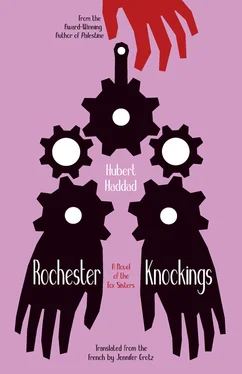They were expecting her that evening in the salon of her host. She had just enough time to change her dress and powder her pale cheeks. Three large chandeliers illuminated the space, varnished parquet floors, ceilings painted by Rubens or his school, colonnades that opened on both sides to stairs or a series of interconnecting doors along galleries. Squeezed into a black coat like all the gentlemen present, Benjamin Coleman showed a joyful impatience on seeing the American woman in the grips of a couple of ladies of the world particularly interested in physiognomy.
“Allow me to borrow her,” he said, leading Kate off by the elbow. Once they were clear of them, he leaned close to her ear: “Beware of Perdita and Fantasima, they are disciples of Ellis Brotherwood. They practice the magical orgasm. .”
With Kate’s hand in his, Mr. Coleman climbed the two steps of the small stage crowded by a grand piano. He pulled his guest to him.
“My dear friends,” he uttered in a majestic tone, “I am immensely proud tonight to present to you the one you are all waiting for. .”
A number of somber people were there, some with beards and monocles and some in sumptuous jewel-encrusted dresses one would marry a prince in. That’s what Kate thought, intimidated by the sudden keen interest she’d become the object of. Her back against the black mirror of the piano, she regretted at that moment not being a concert performer who could escape through Bach or Beethoven. However, her host saved her from embarrassment by asking the audience not to test such a medium as ultrasensitive as Miss Kate Fox.
“Need I remind you that we followers of spiritualism owe almost everything to this beautiful person who comes to us from New York and who, now over twenty years ago, though she is still a little girl, was the first to enter into communication with the other world, if one makes the exception of course of the Cumaean Sibyl or of Jesus conversing with Elijah and Moses. . Our cause however has acquired the most eminent scholars like the astronomer Camille Flammarion, who declared loud and strong at the funeral of Allen Kardec: ‘Spiritism is a science, not a religion,’ or our friend the chemist William Crookes, member of the Royal Academy. Tonight I borrow these words of the discoverer of thallium: ‘Confirmed spiritualists owe this lady an immense debt for the joyous news that she was to a great extent the herald chosen by Providence. .’”
Receiving an ovation, Kate felt a blush rise to her cheeks, but luckily neither a detailed response nor séance was asked of her. Mr. Harisson and Miss Rosamond Dale Owen, two editors of Spiritualist journal, came over to congratulate her around the buffet.
“Have you ever been attacked by evil spirits?” Miss Owen couldn’t help but ask.
“Would you agree,” Mr. Harisson interrupted her, “that Spiritualism is announcing itself to us as the third revelation of God?”
At that moment a young man of an unhealthy thinness, a diamond in his tie, bowed to the company from the top of the platform.
“The previously unpublished sonata you are about to hear was dictated to me by Mozart’s spirit to Allan Kardec. And it’s the communicator spirit of my deceased master, it’s his biomagnetic energy whose interpretation you will hear through me. .”
While the skeleton of a man lifted his coat tails to sit on the piano bench, Kate felt the burn of a glance; a little drunk from three glasses of champagne one after the other, she considered a quite ordinary physiognomy that, with simplicity and relaxation, appeared before her in the guise of a cheerful forty-year-old.
“Rest assured,” said the man in jest, “I am not a spirit.”
A little wobbly, Kate felt immediately at ease, a little like when one spots a good place to hold on to while on a merry-go-round. She would have liked to wrap her arms around the neck of this wooden horse, whose first name was George and who camouflaged his left eye with a tinted monocle. The stranger replied with a hilarious jubilation at her tipsy curiosity. Had he had too much to drink, too?
“In fact, I am the lawyer of our three-striped clownfish, for what concerns his purely material affairs.”
“Is Mr. Coleman on trial?”
“An influential man such as your host sometimes has to be defended. But it has to do only with capital and investments. Between us, I don’t think that spirits, if they exist, have much need for lawyers. .”
For a whole year, sponsored by Benjamin Coleman, whose eager efforts to treat her like a parent and ally did not escape her, Kate was exhibited to the fascination of the London gentry, to the benign curiosity of neophytes up from the suburbs, or to the species of fervent rivalry of international followers. Spiritualist circles, congregations, and learned societies invited her to well-attended séances, with or without conferences of experts, all over England and the capitals of Northern Europe. Kate learned at these meetings much more than what she thought she knew. For instance, the spiritual world preexisted us with its hierarchies of angelic substances not unlike the Catholics’. That souls evolve from the mineral into the human. That spirits, all wandering and more or less dematerialized, are heading toward the indivisible way of perfection and are broken down into the impure, the spirits that knock, spirits who falsely claim authority, neutral spirits, etcetera, on the low scale still dependent on passions and matter; and on the high scale illuminated by divine intuition: the benevolent spirits, learned, wise, and superior spirits, like Jesus, Gautama Buddha, or Zoroaster, just before the beatific erasure into divinity. The formidable challenges of an omniscient seer such as the Scottish Daniel Dunglas Home, of a certain Madame Blavatsky upon her return from Cairo, or of the illustrious Florence Cook who materialized a full-length ghost walking for the first time in her darkroom (that of the not least venerated Katie King, who had died two centuries earlier), were only building in a spectacular way upon a multitude of experimenters of the shadow who, recently, were pronouncing with the projections of ectoplasms and other remarkable phenomena the hypothesis of the perispirit, an intermediary element between spirit and matter, a sort of fluid continuation or electromagnetic division of the astral body in two, with evidence gathered of fingerprints in paraffin molds, the levitation of furniture or operators, the contribution of objects from the other world or even the glimmers on photographic plates, the new infatuation of darkrooms.
Kate however had still benefitted from the prestige of origins and was for many a symbol and an augur. Thus the Empire’s wars and revolutions did not prevent Queen Victoria, eternally mourning the prince consort, from secretly welcoming the little American so that she might comfort her with a thought of the afterlife between two government meetings.
There were other parties at Chelsea. Kate met new faces. The naturalist Alfred Russel Wallace explained to her the effect of rivers on the distribution of inbred animal species and offered her a magnetite from the Malaysian Islands. An old French writer accustomed to exile invited her to Guernesey where he voluntarily resided since the death of his grandson and wife. A blind countess made her the gift of a silver plaque of the divinatory virtues that represented her from the time when she could see, eyes wide open. Several young girls of the aristocracy fell in love with her out of whimsy, mimicry, or contagion.
One night in November, 1871, the lawyer George Jencken resurfaced, invited by circumstance. Suddenly free of his tinted monocle, with one eye gray and the other green, Kate understood while staring at him the agitation that had inhabited her ceaselessly for months. Encouraged by the good omen of her pallor, George, without the knowledge of her protector, dreamily asked her hand in marriage.
Читать дальше












